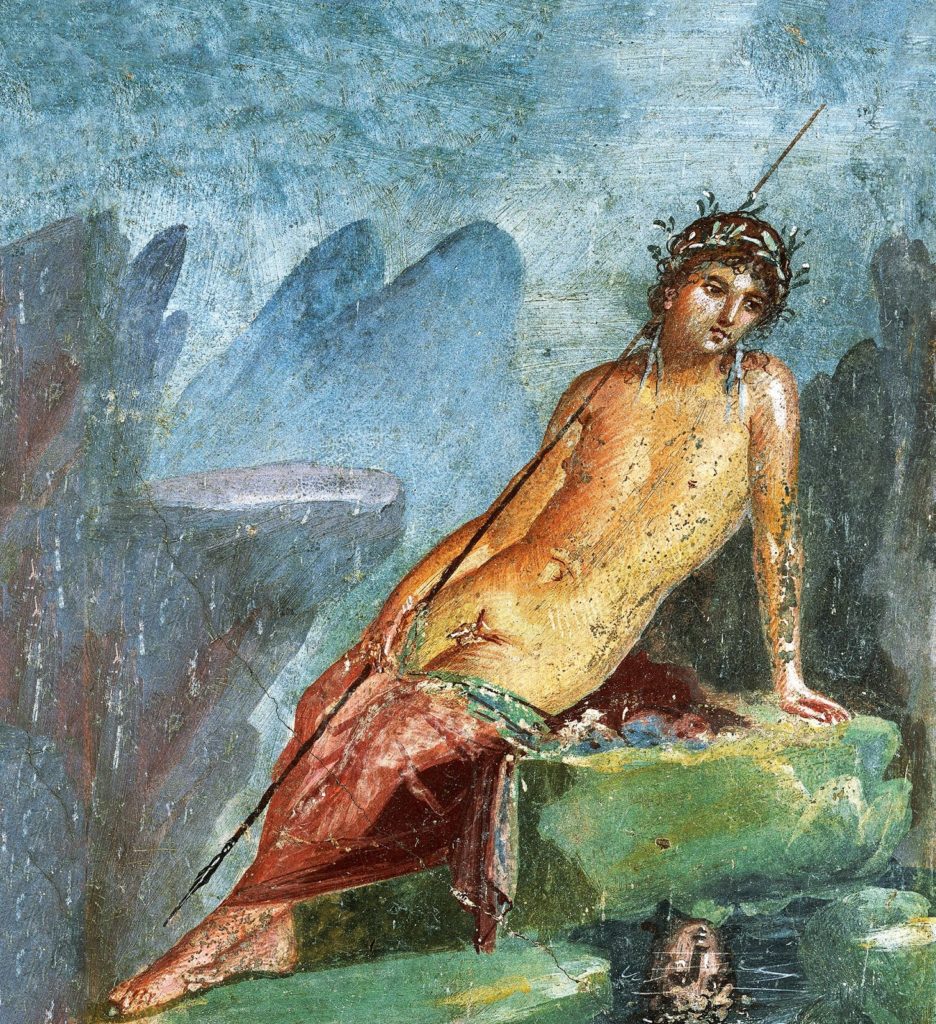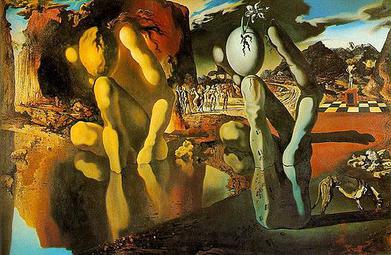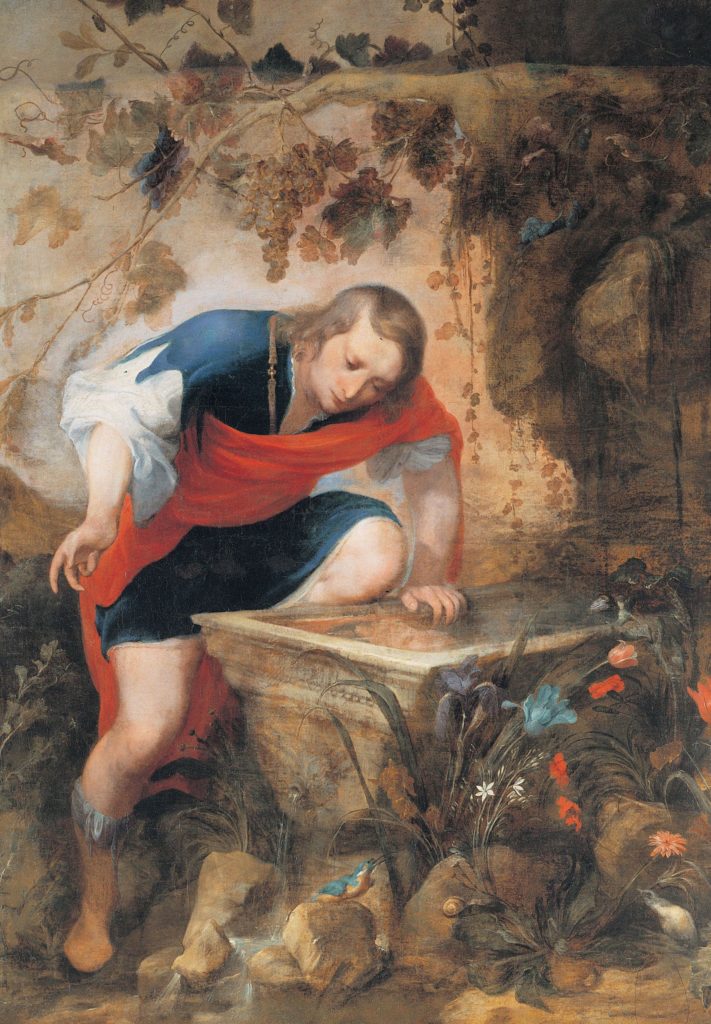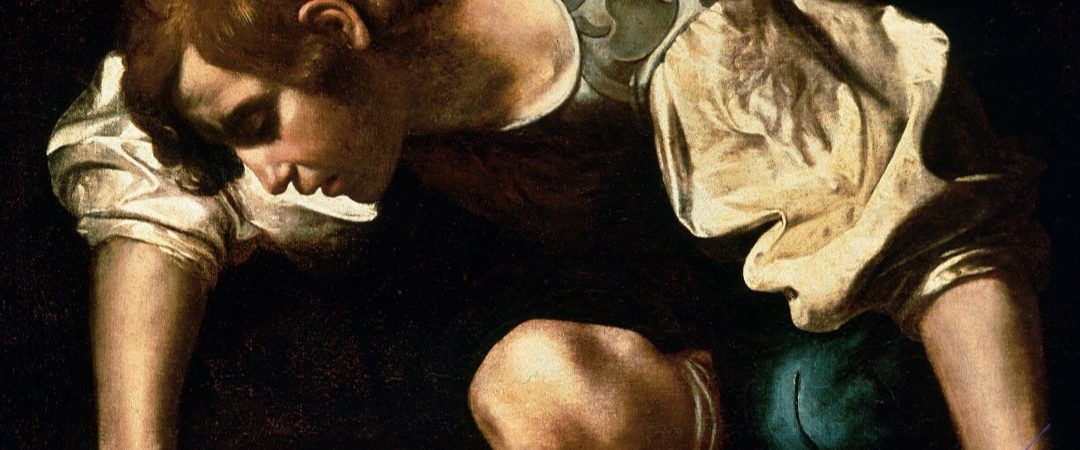How do you pronounce Narcissus?
Narcissus is pronounced “nah-siss-uss” with emphasis on the “siss”
The Tragedy of Narcissus

Ancient fresco depicting Narcissus in Pompeii
Narcissus was a handsome young man who was loved by all who met him. One day, he came across a pool of water and, seeing his own reflection, fell in love with himself. He was so entranced by his own beauty that he could not tear himself away. Narcissus wasted away, Eventually, he turned into a flower that bears his name to this day.
The legend of Narcissus is often invoked to caution against the dangers of vanity and self-absorption. Narcissus represents the dangers of being so in love with oneself that one forgets about the world around them. The story is a warning against letting oneself be consumed by vanity and pride. However, it can also be interpreted as a story about the power of self-love. Narcissus loved himself so much that it consumed him completely. While this ultimately led to his downfall, it also speaks to the transformative power of self-love. Narcissus shows us that, when taken to extremes, self-love can have both positive and negative consequences.
Who was Narcissus?
Narcissus was a young Demigod, the son of the river god Cephissus and nymph Liriope. He was a hunter from Thespiae in Boeotia, who lived far from civilisation due to his annoyance that almost anyone who saw his handsome face would ask to marry him. He would always refuse these advances, often cruelly, as he regarded no one as his equal in beauty.
Who was Echo?
Echo was a young Nymph with excellent hearing and the ability to project her voice far away. She used these abilities to listen out for Zeus’ wife Hera, and distract her from discovering Zeus’ infidelities with the other Nymphs. Hera eventually discovered Echo’s deceptions, and cursed her to lose her voice, only able to mimic and project the sounds and voices she hears.
Narcissus’ Rejection of Echo
Following a night of celebration, Narcissus wandered the woods in search of his friends, calling their names. Echo happened to be nearby, and copied Narcissus’ calls. Intrigued, Narcissus continued to call, wondering if there could be another Narcissus in the woods. Echo saw Narcissus’ face and fell instantly in love, she followed Narcissus, and her mimicry became louder and clearer. Narcissus could tell the source of the voice was nearby, so he laughed and asked to meet the person with the beautiful voice. Echo was overcome with passion, and leaped from behind a tree to embrace Narcissus. Disappointed that the voice had not come from someone he considered his equal, Narcissus instantly rejected Echo and ran away. Echo was devastated and withdrew to a cave, weeping for days until she wasted away and died.
The Curse of Nemesis
Nemesis, the goddess of vengeance, took pity on Echo and cursed Narcissus. Narcissus soon saw his face in the reflection of a pool of water outside a cave, a pool made of Echo’s tears. As soon as he saw his reflection, he was completely enthralled. On his hands and knees he pressed his face as close as he could into the pool without disturbing the water surface, and stayed there, staring, without eating or drinking for ways, until he wasted away and died, just as Echo had done.
Narcissus’ Flower
Nymphs are beings of nature, and leave behind new natural phenomena when they die, including new plants and animals. Echo left behind her mimicry, and Narcissus, who was half Nymph himself, left behind the white Narcissus flower, a symbol of vanity, loneliness and unrequited love.
Narcissus in Psychology

“Metamorphosis of Narcissus” by Salvador Dali (1937)
Narcissism is a personality trait that has been studied by psychologists for many years. The term originates from the Greek myth of Narcissus, who was a young man who became so obsessed with his own reflection that he eventually wasted away and died. While the Narcissus myth is extreme, it provides insight into how Narcissistic Personality Disorder (NPD) develops. Narcissism is thought to develop as a result of early childhood trauma or neglect. Children who do not receive adequate love and attention from their caregivers are more likely to become narcissists. This is because they learn to cope with their feelings of insecurity by developing an inflated sense of self-importance. As adults, narcissists tend to be overly confident, arrogant, and demanding. They often have difficulty maintaining healthy relationships and may only care about themselves. If you think you or someone you know may be suffering from NPD, it is important to seek professional help. Narcissism can be a very destructive personality disorder, but with treatment, people with NPD can learn to live happy and fulfilling lives.
Narcissus FAQ

“Narcissus at the Spring” by Jan Roos
What is the story of the Narcissus?
The Narcissus flower in legend was born from the emaciated body of Narcissus after he died from dehydration and exposure because he would not look away from his reflection in a pool of water. Narcissus was a demigod, son of a Nymph, Nymphs always leave a new phenomena in nature when they die, his was the Narcissus flower.
Was Narcissus a narcissist?
A narcissist is a person with narcissism, or a narcissistic personality disorder. Narcissism is a self-centered personality style characterized as having an excessive interest in one’s physical appearance or image and an excessive preoccupation with one’s own needs, often at the expense of others. Whilst the final tragedy of Narcissus in myth might seem to conflict with the traits of a narcissist (his self-obsession lead to him dying of self neglect, an abandonment of his own needs, and he did not harm others) this was the result of a curse from Nemesis. His normal behaviour involved the constant rejection of others as being unworthy of his beauty, and a callous disregard for how his rejections would affect others. This trait somewhat aligns with a narcissistic individual
Why did Narcissus fall in love with himself?
Narcissus arguably always loved himself, he had such a high opinion of his own beauty that he did not see any suitor as worthy, and he initially pursued the Nymph Echo due to her unintentionally mimicking his voice, but rejected her when she was not as beautiful as he expected someone with his voice to be. The curse of Nemesis may have simply magnified his self obsession to a deadly degree.
Why was Narcissus turned into a flower?
As the son of a Nymph, Narcissus was destined to leave behind a new natural phenomenon upon his death. The Narcissus flower he left behind became a symbol of both Narcissus’ beauty and vanity, and Echo’s unrequited love. This flower would later be used to guide the goddess Persephone back to Hades during Winter, similarly symbolising Persephone’s beauty and Hades’ unrequited love for her.

